#light analysis
Explore tagged Tumblr posts
Text
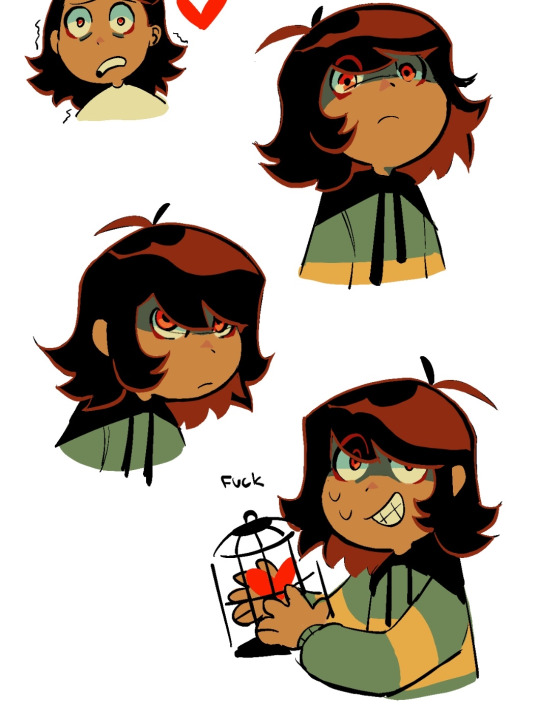
Kris's scary red eyeballs <3 The top left is the forehead reveal that you'll never get to see.
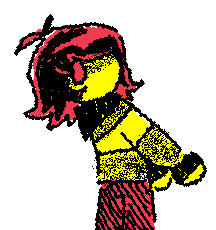
The thing I used to make this image Yapping and misc doodles bellow the cut
Does anyone know how the fuck Kris is ranked 3rd in the whole class?
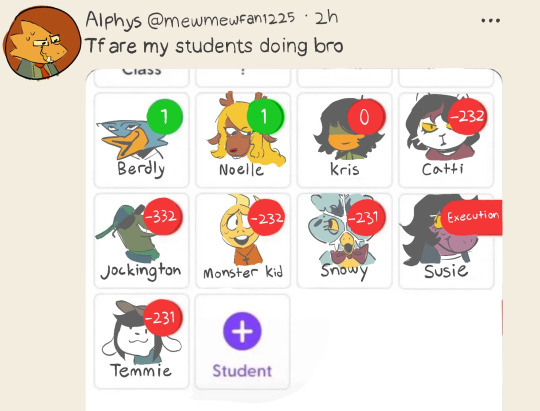
Either the bar is abysmally low or they're just cracked despite sleeping through lectures and not studying. I'm leaning toward the ladder. I think they're one of those kids that doesn't study or try during high school, but still gets decent marks. You know the type. Noelle mentioned that they've asked for her help studying before. Though, I feel like this might have been one of their excuses to hang out at Noelle's house. Kris is so interesting to me. They are so goddamn shady and aloof, but also really silly. Rotates them in my mind.
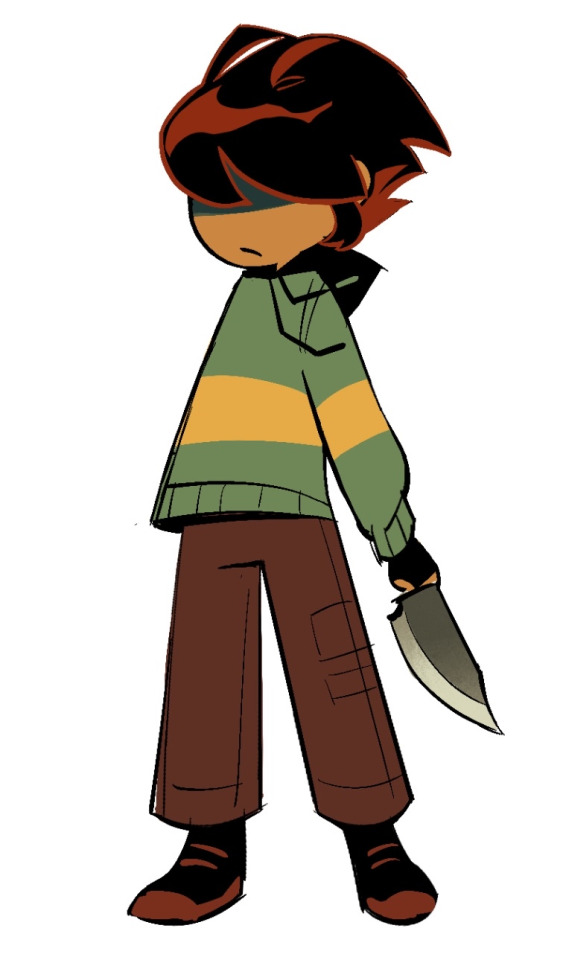
#deltarune#fanart#kris dreemurr#kris#alphys#noelle holiday#catti deltarune#jockington#monster kid#snowdrake#susie deltarune#temmie#light analysis#of kris deltarune#deltarune fanart#doodles#art spread
383 notes
·
View notes
Text
The way Remmick dunking Sammie in the climax of the film worked as a forced baptism? A precursor to a ‘conversion’ to vampirism? The one-sided conversation Remmick has about the imposition of Christianity, his own forcible conversion that he now inflicts on another young man, all while speaking as though he, Remmick, is better and more enlightened than his own oppressors? The violence of the scene, the terror and distress we see on Sammie’s face as he is waterboarded by Remmick. That it is all a metaphor for the actual violence of forced conversion, the mental, emotional, social and even physical helplessness and disorientation that is felt in the victim made tangible through Caton’s performance. All of it inflicted with an intention to control and subjugate.
Holy. Goddamn. Shit.
#don’t even get me started on the lighting and sound and editing for that scene??????#oh my god. when Sammie grabs the guitar the tool of his ancestors and his actual religion. the one he believes in and carries with him#and uses it to smash remmick’s head in??#there’s a flash of lighting and a soundscape of rock music??#remmick’s pretention is shut down#bills were due on that day. because they acted their asses off#this was a team effort I know. cameras and editing team and sound crew everyone#wowee#sinners#sinners 2025#sinners (2025)#sinners spoilers#Ryan Coogler#my post#miles caton#sinners analysis
4K notes
·
View notes
Text
GREAT TAKE op!!! makes me think about the absurdity of the whole catra/caitlyn comparison. in my opinion, if anything, caitlyn has more in common with adora than she does with catra.
TO PREFACE: my take after this paragraph is a very surface level comparison as i don’t really find that the characters are THAT similar!! but i do think it’s odd that people take such stretches to compare caitlyn to catra when she truthfully probably has more in common with adora.
in different ways, both are blinded by their motivations in such a way that they discard the person closest to them. (this is not to say that adora’s leaving catra in the fright zone is quite the same as caitlyn’s outburst toward vi in s2a1 but narratively they serve similar functions). also i understand that caitlyn’s motives were primarily driven by vengeance, while adora’s were driven by empathy for people outside of the fright zone. because of this, they take opposite directional arcs (adora embraces heroism while caitlyn embraces villainy), they both are unexpectedly presented with immeasurable amounts of power (she ra’s sword and powers and the kiramman key/becoming a commander) and struggle to maintain their senses of self while learning to wield such power. AND they both threaten to buckle under the weight of the legacies attached with such power (adora with she-ra/mara and caitlyn with her mother/ambessa).
just interesting to think about!
hot take but Timebomb has more in common with Catradora than Caitvi does: childhood friends to enemies to lovers(?) where ones the right hand to the guy making everyone's lives worse (Catra&Hordak/Jinx&Silco) the other is the rebellion (Ekko and the Firelights/Adora and the Princess Alliance), they actively almost murder each other quite a few times on the battlefield, at one point there's an alternate dimension where everything is "almost perfect", one becomes suicidal after losing everything/one and they have to fight a robotic overlord that mind controls everyone to not have free will, oh and one gets a dramatic haircut
like you saw Caitlyn in that "Commander Kiramman" role and just Ran with it despite when putting further thought into it, she and Catra have basically Nothing in common
#people really dont understand the media they consume these days#catradora#caitvi#piltover's finest#vi arcane#caitlyn kiramman#spop catra#spop adora#spop#she ra#arcane#arcane lol#arcane league of lesbians#arcane league of legends#comparison#light analysis
183 notes
·
View notes
Text
It’s heartbreaking to know that when Anshi looks back on her first encounter with the late emperor—the man who sexually abused her for years—she can only describe her 10-year old self as ambitious.

In the light novel, Anshi is far less aware of why she was sent to the rear palace, and it’s clear in the books that she did not intend to grab the emperor’s attention.
But in the manga—now the anime—she says she knew, that she understood what she was getting into, and that she reached out to him deliberately.
This is very likely a lie she told herself to cope with the trauma of the abuse she endured, abuse that dictated the course of the rest of her life, for better or for worse.
Because, even if Anshi knew, on paper, what her father intended by sending her to the rear palace, what 10-year old would understand, truly, the implications of winning the emperor’s favor? What prepubescent child fully understands sexual grooming or abuse for what it is, understands how it will hurt them?

Anshi falls for the oldest lie children of sexual abuse tell themselves: that they brought this upon themselves, that they were somehow responsible for what happened.
Telling herself that she put herself in his path out of ambition gives her the illusion of agency. It allows her to ignore the glaring, obvious signs that she could not have refused him if she’d wanted to. It is also a manifestation of her own self-loathing, the all too common misplaced guilt that rape survivors feel in the wake of their assault.
This particular coping mechanism is what drove her to assault the late emperor right back when she was in her late 20’s.

That helplessness, that rage, that unresolved trauma, led to her repeating the cycle of abuse, led her to forcing herself onto him as an adult to reclaim that agency she knows she never had.
And this assault brought about her second pregnancy—the birth of the moon prince, the current emperor’s younger brother.
And even though Anshi knows Jinshi is Ah-Duo’s son, not hers, Anshi was still the woman who raised him. She feels this guilt and revulsion every time she looks at Jinshi, especially since he resembles the late emperor so strongly.


And even though Anshi loves Jinshi deeply, she is constantly haunted by the self-loathing she associates with him. She calls his very existence immoral, a living embodiment of her sins. And it’s so heart-wrenching, so tragic that she blames herself for everything, that she believes all of this happened due to her own, selfish sense of ambition.
#the apothecary diaries#kusuriya no hitorigoto#jinshi#anshi#knh#apothecary diaries spoilers#knh spoilers#light novel spoilers#knh manga spoilers#maomao#jinshi apothecary diaries#apothecary diaries#apothecary diaries jinshi#anshi apothecary diaries#the late emperor#knh season 2#apothecary diaries season 2#knh episode 33#knh season 2 episode 9#apothecary diaries meta#apothecary diaries analysis#neo queen serenity’s posts
5K notes
·
View notes
Text
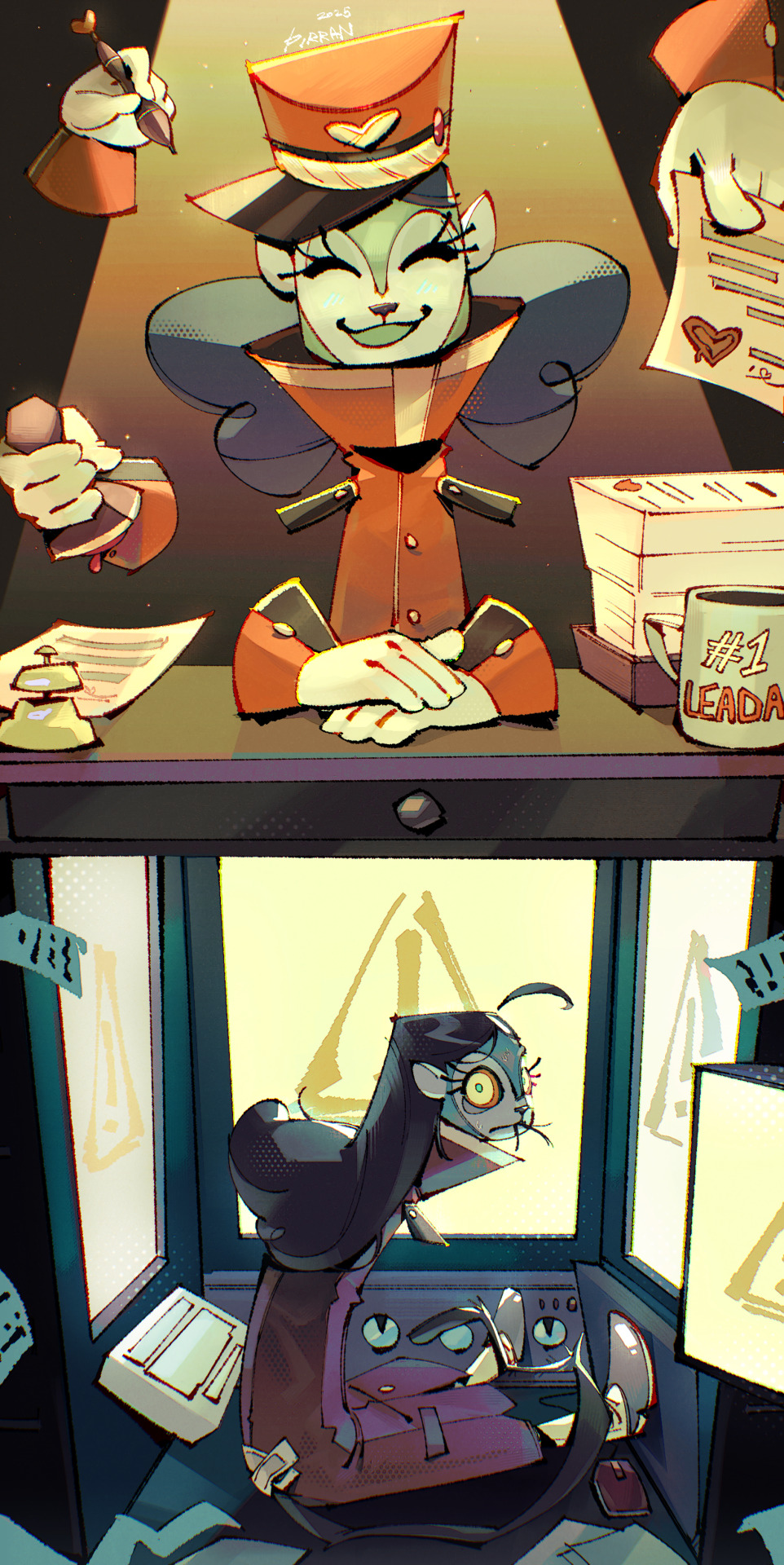
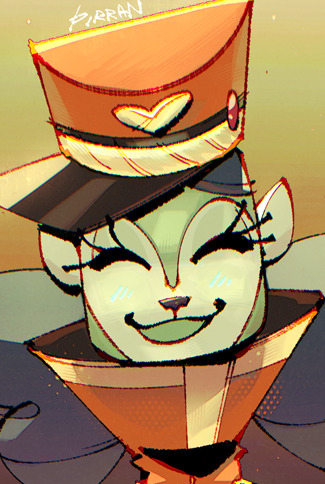
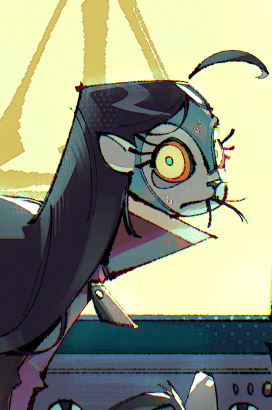
How can I help you today?
#great god grove#ggg inspekta#he's so fun to dissect and overanalyze teehee (I'M SOOO NORMAL ABOUT HIM TOTALLY NOT WRITING A WHOLE ASS CHARACTER ANALYSIS TRUST)#also i realized very late into the artwork that#the light in the upper half and the desk in the lower half kind of form a coffin shape-wise#...well it IS a cool looking composition XDD#also WDYM WORK TIME 11 HOURS LIKE BRO???? i really did lock in this time....
1K notes
·
View notes
Text
the madam watching jinshi and maomao yesterday was literally the entire jinmao fandom.

#the apothecary diaries#kusuriya no hitorigoto#jinmao#jinshi x maomao#maomao#jinshi#apothecary diaries anime#apothecary diaries manga#anime analysis#manga thoughts#anime fandom#light novel discussion#romance anime#slow burn romance#anime meta#historical anime#maomao and jinshi slow burn#littlecake manga#manga and anime
640 notes
·
View notes
Text
So y'all remember one of the very first scenes in bsd, right?

Yanno, the one where Kunikida's kind of disgusted bcz Atsushi's "shamelessly eating so much food with his money" and calls Atsushi a brat but pays for him anyways and then Atsushi mentions he's a poor jobless orphan and it's one of their first interactions after originally meeting whilst Kunikida was on the job and Kunikida has no idea he's soon going to be Atsushi's superior at the detective agency?
Yeah well

#Once again i am plagued by the similarities between Fukuzawa and Kunikida#and also in this case the similarities between ranpo and atsushi#onky difference between them is that kunikida called atsushi a brat when he wasn't and fukuzawa didnt call ranpo a brat when he def was#🩶#bsd analysis#bsd kunikida#kunikida doppo#bungou stray dogs kunikida#doppo kunikida#kunikida bsd#bsd atsushi#atsushi nakajima#bungou stray dogs atsushi#bsd fukuzawa#fukuzawa yukichi#bungo stray dogs fukuzawa#president fukuzawa#ranpo edogawa#bsd ranpo#bungou stray dogs ranpo#bsd edogawa rampo#bsd rampo#bungo stray dogs rampo#rampo#bsd anime#bsd light novel#bsd manga#bungou stray dogs#bsd#bungo stray dogs
760 notes
·
View notes
Text
this has probably been talked about before but damnit i want to see more of the death note characters struggle.
i want to see light flinching at fireworks and his father's touch after the faked execution. i want to see him habitually turning to an empty chair, picking up a tennis racket, absentmindedly making tooth-rotting coffee before he realises L isn't there anymore.
i want to see misa installing multiple locks on her door after her parents' murders, making multiple trips at night just to check the doors are locked. after she gets married to light, i want her to complain to the empty air, to say a hasty goodnight before realising that no-one is there to listen any longer.
i want to see kid L staying up late alone, face lit by a computer screen. i want to see him before his death: i want to see his last moments with the man who raised him, his last night with the only one who understood him, him knowing that death's finally starting to catch up.
i want to see near trying to live up to the title of L. i want to see him staying up more at night, dropping sugar cubes in his tea even though he knows it's stupid.
i want to see mello digging his nails into his skin, chugging energy drinks, just to stay up and study for a little while longer. i want to see him doing anything to win and regretting it later on when he's alone. i want to see him keeping matt's goggles in his pocket after his death.
i want to see matt blaming himself after he sees mello spiral, maybe even blaming L and purposely scoring lower on his tests so he won't become the next L. i want to see matt choosing to follow mello out of the orphanage anyway and them having a big argument about it because mello didn't want matt to have to sacrifice everything he'd known for him.
i want to see kid sayu trying her best to live up to her brother's image, trying to be 'the smart one' because that's what light was and so she figures that's what she has to be, too.
i want to see sachiko, after her son's and husband's death, make a portion large enough for four, set a table for four and leave the door open every day at nine until she realises no-one is going to come home.
okay so i know that death note is an action-centered anime and having things like these would slow down the plot and maybe bore the readers. but i also think that all these show their humanity and also is part of the problem that light and L both show the readers: sometimes you get so caught up in the game, in the thrill of it all, that you forget the pawns you're playing with are not plastic pieces but real, living human beings.
#death note#light yagami#l lawliet#death note brainrot#death note headcanons#implied lawlight#implied remisa#misa amane#nate river#mail jeevas#mihael keehl#death note meta#death note character analysis
843 notes
·
View notes
Text
the outfit parallels to season 1 are going to put me in a god damn coma,, if you hear nervous laughing sorry that’s just me because WHAT THE FUCK

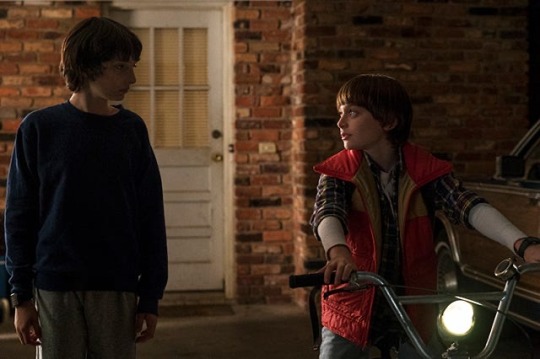
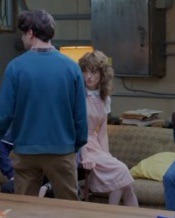

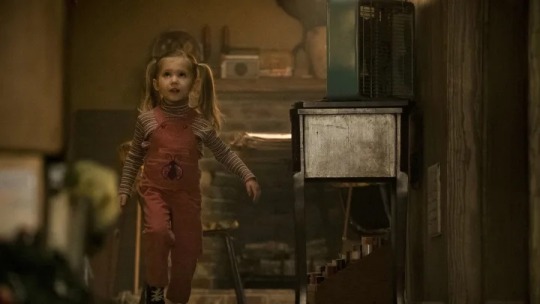
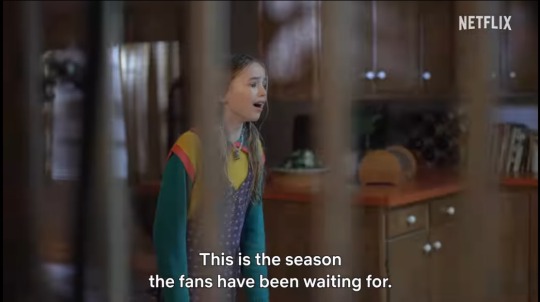
#byler in the same color scheme as s1 ep1 and they seem to be in those outfits a lot in s5 from pics we’ve seen#i know el was wearing nancy’s dress in s1 but why would nancy be wearing a very very similar dress in s5 😳#also holly in her overalls and stripped shirt each time she’s in a room with flickering lights i’m!! not!#okay!!#ok i said holly is wearing a striped shirt in s5 but it’s just multicolored but whatever she’s still wearing overalls#byler#will byers#mike wheeler#nancy wheeler#el hopper#el byers#holly wheeler#stranger things#stranger things 5#stranger things s5#stranger things season 5#st5#st5 bts#st5 production#st5 analysis#stranger things analysis#st5 theory#st5 theories#stranger things theory#stranger things theories#stranger things bts#stranger things production
2K notes
·
View notes
Text
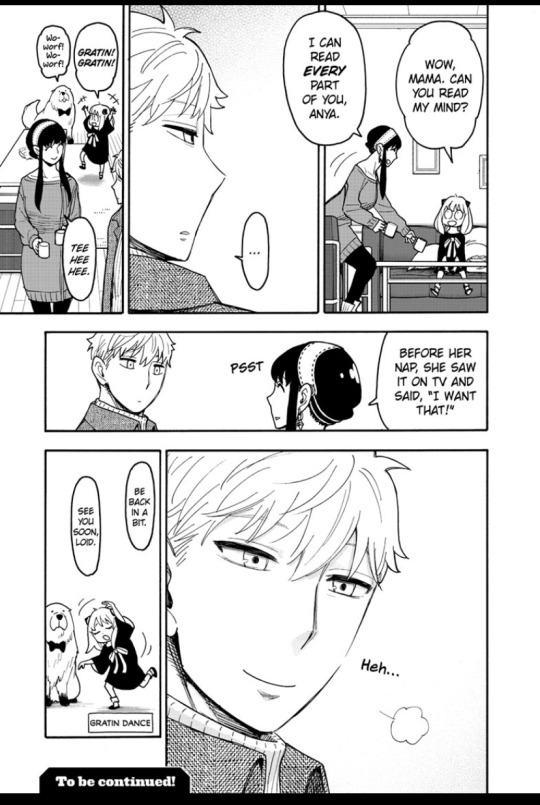
God again I’m just so obsessed with how far this family has come and how with every chapter they just behave more and more like a family and less what a family should be like.
Like a couple chapters ago Yor was still calling her Miss Anya and now that’s her mom. She would have never jokingly “lied” to her before and would have even freaked out at the mere question there was something less than normal about her. But here she is your honor this is a family.
My favorite thing about spy x family has always been how consistently Yor has Anya’s back no matter what shit she gets into Anya akways stands ten toes down because she knows Yor is always rocking for her. I think a lot about how the way Loid chose to comfort Yor and reassure her abilities as a mother is by telling her that she makes Anya brave because she know Yor will always, always protect her and just what else is a parent than someone that makes you brave?
It’s even more poignant to come in a chapter where we are introduced to Anya’s birth mother for the first time and there’s definitely the similarity being drawn. Yor loves Anya would give everything up for her but would also do anything to make the world safe for her. When Yor felt there was no reason to go on with her spy work she thought of the little family she’s made for herself, of the little troublesome girl she’d risk it all for and she just knew that there were still people worth making the world safe for.
God I love this family
#me rambling because god I love Yor and Anya#like that’s really her mother for real#also it’s just rare when you see the mother figure as this paragon of strength#and Yor is painted in much the same heroic light usually reserved for anime fathers#but yeah it’s just such a little mini inversion of gender roles with Loid playing more the part of nurturer#especially in a world that seems to live with rigid rules of proprietary#also love how all the big actiony fights are saved for Yor#I love this manga so gucking much 😭#yor forger#loid forger#anya forger#Yor and Anya#spy family#spy x family#sxf manga#sxf spoilers#sxf#sxf loid#sxf anya#sxf analysis#sxf yor#loid x yor#twiyor
580 notes
·
View notes
Text
Really REALLY important to me how almost every darkner we meet seems to instantly love Susie. Lancer immediately looked up to her the second they met, and it was probably the first time in a long time (or her whole LIFE) where someone looked at her without prejudice in their eyes and just genuine curiosity to get to know her better. Not only that, but to admire her for who she is!
Then came Jevil, Queen, Tenna, Jack, Gerson... Not to mention all the other darkners who have not shown an ounce of fear or rejection towards her (excluding the ch1 ones who only knew the scary mask she put up to protect herself). She has tea parties, training sessions, concerts... And when she walks in Castle town, nobody backs away.
#deltarune#mys text#not meant to be like an analysis or anything i just felt so emotional#to think that this child who grew up beliveing she was unlovable and unwanted now has so many people that look up to her#things may not be good in the light world yet. but at least somehwre in the dark she is loved
392 notes
·
View notes
Text
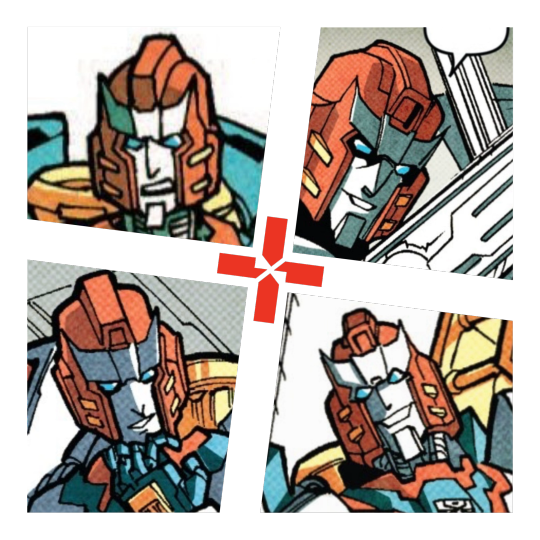
Medic, Maverick, Maniac, Murderer: Understanding Pharma
First thing’s first: I love Pharma, dearly.
In all the time I’ve spent evaluating his character, I’ve mainly focused on what can be worked out about who he is as an individual: his core sense of self, psychological drives, subjective worldview, etc.
When all else is stripped away, who is Pharma?
This treatise is the product of obsessing over Pharma, analyzing canon (and extras), and reading as many different perspectives on his character from fans across the fandom as I could find. The post is long, so for those of you who balk at the thought of reading a shortfic’s worth of Pharma thoughts, feel free to read the TL;DR (Conclusion) at the end and then decide if the full read is worth your time. Also, a premium reading experience is available in the form of the original Google Doc version.
As you read, keep in mind that this is primarily a mix of psychoanalysis, evidence-based examination, and speculation—not moral, ethical, or sociological commentary. The goal is to examine Pharma’s psychological drives and core values, and each of his appearances in the context of those. All other types of evaluation are up to readers.
Now, take your victim blaming-allergy meds (just in case); remove your black-and-white thinking caps; and leave your personal morality lenses at the door.
Psychological Drives & Core Values
Why does Pharma act the way he does? What gives him a reason to keep living? What are his personal priorities?
At the beginning of the Delphi arc, First Aid establishes Pharma as a “control freak” and someone who “thinks he’s an expert on everything.”

Now, First Aid has a habit of complaining about his bosses, but on both points, there’s canon evidence to back them both.
Expertise and Intellect
Throughout the Delphi and Luna 1 arcs, it’s established that Pharma is a skilled and brilliant doctor.
He once performed a 4-way fuel pump transplant, donating his own fuel pump in the process. (see above panel)
Later, he invented a soundbomb that left an echo laced with a virus and invented an antidote to that virus:
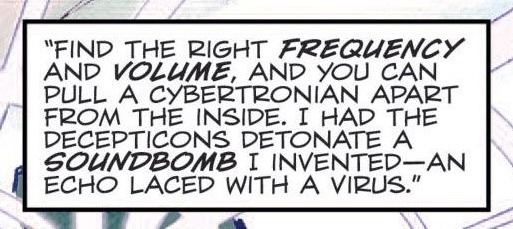
And on Luna 1, he was on the edge of finding a cure for Cybercrosis, based on the fact that Swerve was able to formulate a cure from his notes.
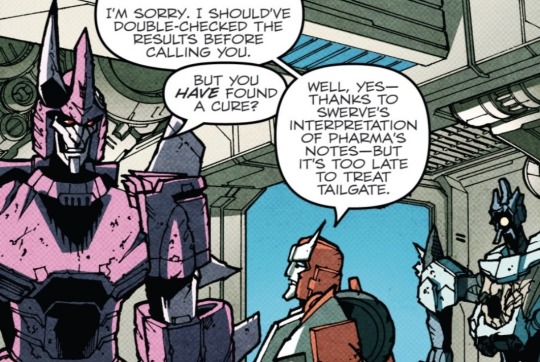
More than being a doctor, Pharma lives for intellectual and scientific achievement as a physician scientist. He feels most alive when he’s able to solve complex medical problems, and when his achievements are recognized by those whose opinion he considers important.
This is Pharma’s 'why.'
And even though he’s arrogant and enjoys praise, it’s not his primary motivation. He doesn’t need it in order to set his mind to whatever he’s interested in, although he’ll seek it from those he values most (i.e. Ratchet).
Pharma sees himself as less of a doctor, and more as a scientific innovator or medical maverick. The practice of medicine is primarily a catalyst for his creativity and intellect; it’s not an end in and of itself like it is for someone like Ratchet or First Aid.
First Aid’s observation of Pharma can be better phrased as, “[Pharma] thinks he’s an expert on everything medical”—because he’s not so driven by achievement and admiration that he’ll grovel at the feet of strangers and get good at something he doesn’t personally find interesting. The only time we see him express a desire for praise is when he’s around Ratchet—someone he holds in high regard for both personal and professional reasons. This makes sense since Ratchet is one of the only people who can give Pharma any kind of competition within what he considers to be his area of expertise.
“Each day we go to our work in the hope of discovering—in the hope that some one, no matter who, may find a solution of one of the pending great problems—and each succeeding day we return to our task with renewed ardor; and even if we are unsuccessful, our work has not been in vain, for in these strivings, in these efforts, we have found hours of untold pleasure, and we have directed our energies to the benefit of mankind.” —Nikola Tesla
Ego
Without question, Pharma has an inflated ego, but having an inflated sense of self doesn’t automatically mean a person is a full-blown narcissist or that they are totally uncaring.
Every personality trait exists on a spectrum. Yes, Pharma is arrogant, but the presence of arrogance doesn’t automatically and completely cancel out all “positive” traits. (For fun, check out studies on Dark Tetrad and Light Triad personality traits.)
People are complex. Arrogance can coexist with genuine kindness, ruthlessness can coexist with deep compassion, etc.
Whether Pharma exhibits genuine kindness is up to each reader’s interpretation of what little canon material exists, but the point is: Pharma’s arrogance doesn’t automatically rule out the possibility of authentic “positive” traits.
Controlling Tendencies
Pharma is comfortable pulling the power card and using it to dump what he sees as uninteresting parts of medical practice on those below him:
“So Fisitron’s writing about the Wreckers’ elbows now, is he?” said Delphi’s Chief Medical Officer. “Come on, First Aid - get to it. You’ve got a Fader in Row 2 downstairs.” He squeezed the air with his finger and thumb. “He’s about this far from shutdown.” —from Bullets by James Roberts
However, there’s nothing in canon indicating he’s power-hungry in a megalomaniacal sense. He’s not Starscream or Megatron; he doesn’t seek political or social power. In fact, he seems perfectly happy hiding away in a lab or medibay by himself so he can direct all his energy toward solving issues and achieving the so-called ‘impossible’ within the field of medicine:
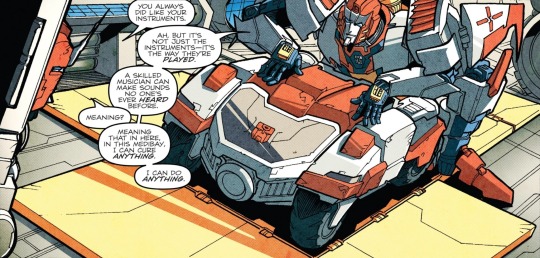
The ways in which Pharma exercises power and control are through his expertise, and his administrative/management skills. That’s it.
Self-confidence
Pharma’s arrogance and controlling tendencies don’t seem to be a mask—like he’s trying to compensate for some sense of lack (in those areas). Yes, he fears failure, and yes, he displays some insecurity when Ratchet questions his competence. But at every other point and in every other way, Pharma is unapologetically self-confident. He’s fully self-assured of his intellectual prowess and problem-solving capabilities; he knows what he knows, and he also knows what he doesn’t know.
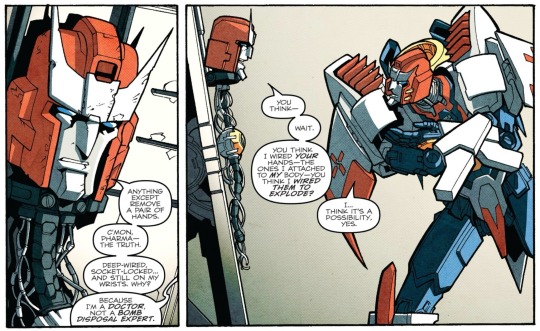
Pharma’s arrogance and desire for control don’t stem from a hidden lack of confidence or a hunger for power on its own. They stem from the fact that he genuinely sees himself as the best person for the work he does. He trusts himself above anyone else to solve problems that come his way—medical or otherwise (within limits).
Elitism vs. Superiority
I’ve always read Pharma as having an elitist attitude, but not in the social stratification sense:
elitist (adj.) relating to or supporting the view that a society or system should be led by an elite.
There’s no evidence that Pharma believes an elite class of people should hold the most power. Instead, Pharma’s “elitism” is actually an individualistic sense of superiority. It’s centered on him alone, and is tied to his capabilities as a physician scientist and surgeon.
Pharma sees himself as the best of the best and makes sure everyone knows it—sometimes through his words, but mostly by his conduct in the field of medicine. This, paired with Pharma’s natural temperament, doesn’t exactly make him socially popular—inside or outside of medicine:
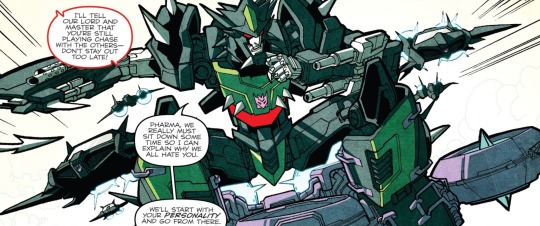
One could argue that the “personality” Lockdown is referring to was a result of all Pharma had suffered at Delphi and Luna 1, but just as easily, one could argue he was always a bit difficult to get along with, and that his traumatic experiences merely magnified his already-present psychological patterns. Personally, I like the latter interpretation because it’s a flaw that makes Pharma a more interesting character no matter his mental state.
Everyone reacts differently to real and perceived social rejection. Some are so concerned about it that they’ll try anything to belong; others genuinely don’t care, and they continue as usual; and still others cope by shifting their mindset and developing a sense of pride in being an outsider.
There’s no evidence for this in canon, but I believe it’s within reasonable characterization boundaries to headcanon Pharma as being in the second or third category.
With either of those two mindsets, a sense of superiority can develop, or even be an inciting factor. Either someone sees themselves as genuinely superior to the majority and doesn’t mind when this alienates them from people, or they convince themselves they’re superior because the pain of accepting they were rejected for who they are is too much to handle.
Whatever the case, the point is, having an “elitist” attitude isn’t necessarily rooted in a sociological or ideological belief. Sometimes, individuals just see something in themselves that—to them—justifies a sense of personal superiority. A quick glance at Pharma’s canon appearances makes it clear he holds such a view of himself, at least to some degree.
Morality and Compassion
When Pharma first shows up in canon, he’s working at the New Institute. A lot of questionable things took place there on a regular basis—things Pharma would have been aware of, to some degree. However, his presence at the Institute doesn’t automatically mean he agreed with everything happening. Depending on how strongly someone feels about something, some people are content to disagree in silence. Not everyone who seeks employment considers it a priority that the establishment they work for aligns perfectly with their moral values. After all, there are other reasons to take a job: financial benefits, exclusive educational and career opportunities, pure convenience, etc.
I’m not here to say either way whether Pharma’s willingness to turn a blind eye to the events at the New Institute was wrong or right; that’s up to each reader to decide for themselves. However, Pharma’s choice to remain employed at the Institute for some time can say something about him as a character: his priority as a doctor and person is not to take care of everyone he encounters, or to act as some kind of moral or ethical authority.
This isn’t to say Pharma won’t ever stand up for something he regards as right or push back against something he sees as wrong, “off screen.” It’s just that everything in canon points more to a tendency to choose his battles instead of acting immediately on any moral sense the way someone like Optimus or Ratchet might.
This also isn’t to say Pharma doesn’t care about saving lives, but from what little is shown of him before Delphi, it’s hard to say how much he cared. Ratchet confirms later that Pharma was an excellent doctor for most of his life, but all that tells us is he was an excellent doctor; it says nothing about his internal attitude toward his work or patients.
However, inferences can be made based on doctors in our own world:
Being a doctor—especially one in trauma care—is far from easy. It takes a lot out of a person, and there are very few people who last in the profession for a long time. Most medical professionals fall into one of the following categories:
People possessing a strong will that’s coupled with an unwavering passion for taking care of others (the public’s favorite)
People who naturally have, or develop, an ability to switch their empathy off and on at will, or build walls around it—also possessing a strong will (the ideal)
People who naturally have a limited capacity for empathy (the one the public hates to acknowledge)
People with a strong social and professional support system (the necessary, but underutilized and underappreciated factor)
Of course, even if a person has one or more of the above, burnout can and does still happen, but individuals who have at least one have the best chances of surviving and thriving amidst the demands of the majority of medical professions.
As far as is shown in canon, Pharma never had a strong support system—either circumstantially or by choice—so something else was keeping him in medicine.
Pharma shows concern for both Tumbler (Chromedome) and Hubcap:
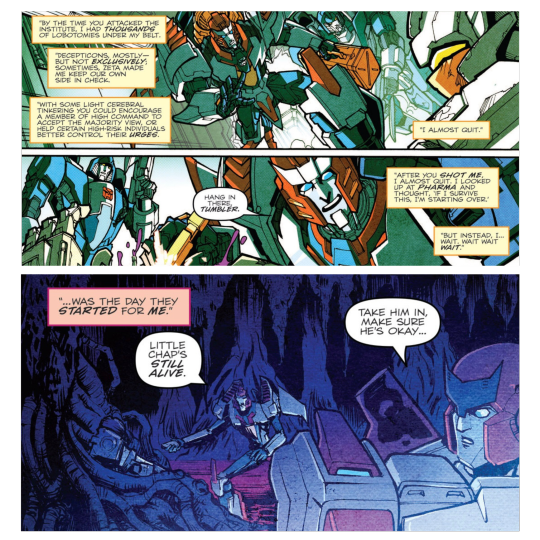
But even though he obviously cared enough to step in, neither instance makes a strong case for a capacity for empathy beyond the “average” or “norm.” Performing a job well is a lot different from being personally invested in the work.
Based on everything up to this point, and this later comment from Pharma, about Ratchet…
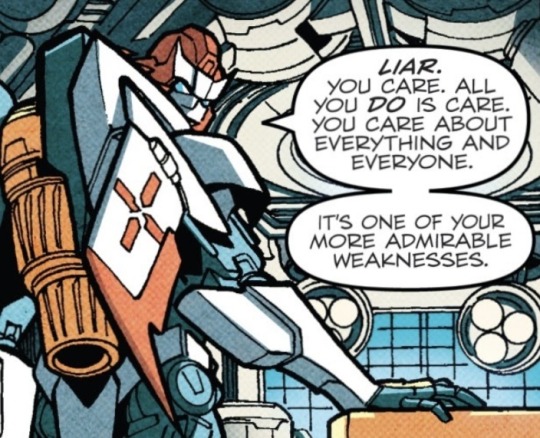
…Pharma has probably never shared the same I-care-about-everything-and-everyone view of the world. Instead, it’s more likely that Pharma holds a more rational view of his work and patients.
One of the first things learned in medicine, especially in trauma medicine, is that you can’t help or save everyone, and to hold yourself to that standard can destroy you quickly if you have a certain temperament or lack healthy boundaries for your empathy.
“There are times when it may seem as though I view sick or injured people not as living, breathing humans with feelings and emotions and people who love them, but simply as cases, as problems to be solved. And that is absolutely true. It's not that I don't have empathy, but the hard fact is that as a doctor, and especially as a trauma surgeon, too much empathy can get in the way of your job and cause you to make decisions based not on sound medical judgment but on your own emotions. Sure, I've seen things that even years later can still make me choke up when I think of them: a little girl shot and killed, a shattered young Marine who shouldn't have died but did. But you can't choke up in the ER or the operating room. To be effective as a trauma surgeon, you have to put a layer of Kevlar around your heart.” —Dr. Peter Rhee, Trauma Red: The Making of a Surgeon in War and in America’s Cities*
Pharma may have learned this difficult truth earlier than Ratchet and developed a practical way of managing his empathy that comes across as “cold.” He may have always had an ability to put up walls around his spark. Or, he may have always had little to no capacity for empathy.
The fact that the morality lock on Tyrest’s portal prevented Pharma from passing through proves he felt guilty for what he’d done, and JRO confirmed this. Therefore, it’s safe to assume Pharma had some level of empathy for his former patients, suffering moral injury when he felt he had no other option but to start killing them.
Still, looking at Pharma’s psychological drives and his behavior throughout canon, it’s clear compassionate care and morality are subordinate to his other values and interests.
*I highly recommend this book, and learning about Dr. Rhee in general. He’s a huge inspiration of mine, and one of my main sources of inspiration when writing Pharma. Level-headed and capable, strong-willed, selectively empathetic, an excellent scientist, etc. He lives for the thrill of practicing medicine both on the floor and as an expert in his field who pushes trauma medicine to new heights through his research. He also takes great pride in his hands. Seriously—the man spent an entire paragraph and a half talking about his “good hands” and how they were one of two reasons he decided to go into trauma surgery. The other reason was that he “liked action and excitement, liked the feeling of being able to walk into a tough situation and take control.” (Sounds familiar…)
Delphi
First thing’s first: we don’t know how much Pharma did or didn’t know about the DJD before agreeing to take the Delphi assignment.
That far into the war, he would have known something about the DJD and their ways of terrorizing traitors and Autobots, but for whatever reason, he took the assignment anyway. Perhaps Prowl assured him the situation on Messatine would be monitored and that the security team would be enough. Perhaps he underestimated the DJD’s capabilities, or scale of territory, and thought he would be able to handle things on his own. Perhaps Prowl gave him no choice. Maybe it was all of these and more.
Whatever the case, according to JRO, Pharma didn’t hate Delphi before the incident with the DJD.
Word of god remains a touchy subject in fandom, but in this case, it’s important because it says two things:
The DJD left the Delphi medical team alone for some time.
Being on the edges of DJD territory didn’t automatically mean isolation and harassment by their hand.
On the second point, First Aid was free to come and go from Messatine as he pleased, seeing as he attended a medical conference at Kimia five years into his assignment at Delphi:
Five years ago [mid-Delphi assignment], the leader of the Wreckers had cornered him at a medical conference at Kimia, the space station that doubled as a weapons research facility. —from Bullets
And five years after that, he was able to not only contact Springer without delay about one of Agent 113’s bullets he’d discovered in an Autobot badge…
He raced upstairs to his computer terminal and typed in a certain frequency code for the second time in his life. A face appeared on the screen and grinned. “It’s me,” said First Aid. “And you're never gonna guess what I’ve got for you..!”
…but he was also able to meet up with Springer to hand off the bullet:
“Your friend has a funny way of making contact,” First Aid had said when he’d got in touch three days earlier, and he was right.
It’s not known if this handoff happened on or off world, but either way, the DJD didn’t interfere.
At some point, Tarn set his sights on Pharma and the Delphi team. Knowing the DJD, one can only imagine what Tarn used to show off his team’s capabilities and convince Pharma the best option was to cooperate.
In striking a deal with Tarn to keep the DJD away from Delphi, Pharma established his territory and ensured his continued security and the safety of his staff. As long as Tarn got his T-cogs, Pharma could continue on in relative peace. He could work his magic on bots that ended up at Delphi, carry out his management duties, and work on whatever projects or research he may have been conducting in his free time.
For whatever reason, after he first came into contact with Tarn, Pharma didn’t call for help. Communications were still operational, as Pharma wouldn’t have suggested contacting High Command about the Duobots if the team was aware of any comm malfunctions:
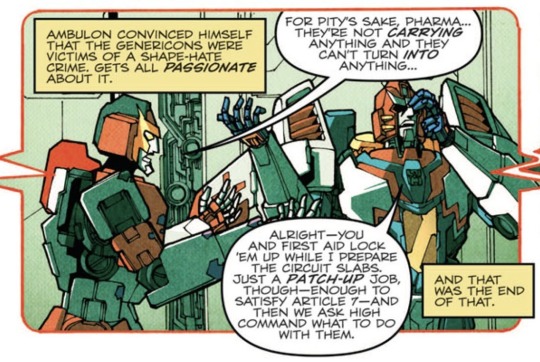
Also, First Aid later confirms that communications were fine until the Big Bang (soundbomb detonation):
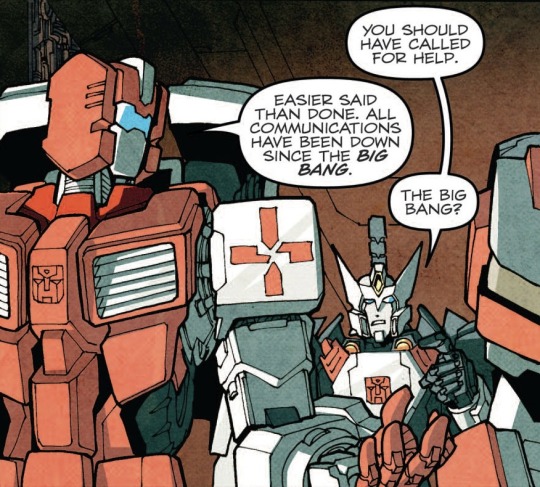
It’s always possible the DJD was monitoring the radio waves, but secure subspace frequencies exist, such as the Datalog Network First Aid used to send the datalog containing the death statistics:

Speaking of which, assuming First Aid sent the datalog with the statistics right when things started to get ‘weird,’ and before the Big Bang shut down comms, it only took—at most—a few days for them to reach Ratchet and Swerve on the Lost Light:

But back to Pharma not calling for help: for all of Prowl’s intel, contingency planning, and fretting over the security of Autobot territories, I find it hard to believe he would have stuck an Autobot medical team on the fringes of DJD territory without giving them some means of securely contacting the outside in case of issues.
But even if Prowl didn’t give Pharma a secure way to contact him or anyone else, and even if Pharma was convinced the DJD was monitoring regular communications, there were other ways he could have reached out for help. After all, the team wasn’t alone on Messatine. Like Pharma said, Prowl continued to send bots to defend the nucleon mines:
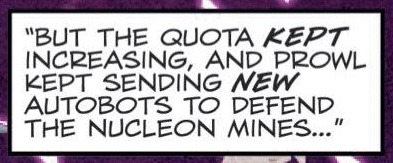
The Autobots had been mining nucleon for millions of years at this point, so I doubt the mined nucleon was just sitting in storage on Messatine; shipments of the stuff would have been sent off-world to wherever the Autobots needed it. Why not send a message for Prowl with someone leaving with one of those shipments? A message meant only to be sent over a call when absolutely certain they were out of range of the DJD’s potential monitoring.
Or, why not order in off-world medical supplies and send a message back with the delivery bot(s)?
There are two possible answers to this. One takes into account JRO’s word on the subject; the other is more intricate and speculative on my part, but it leads to the same place. So whatever your stance is on the validity of word of god, there’s an answer for you.
Answer one (word of god)
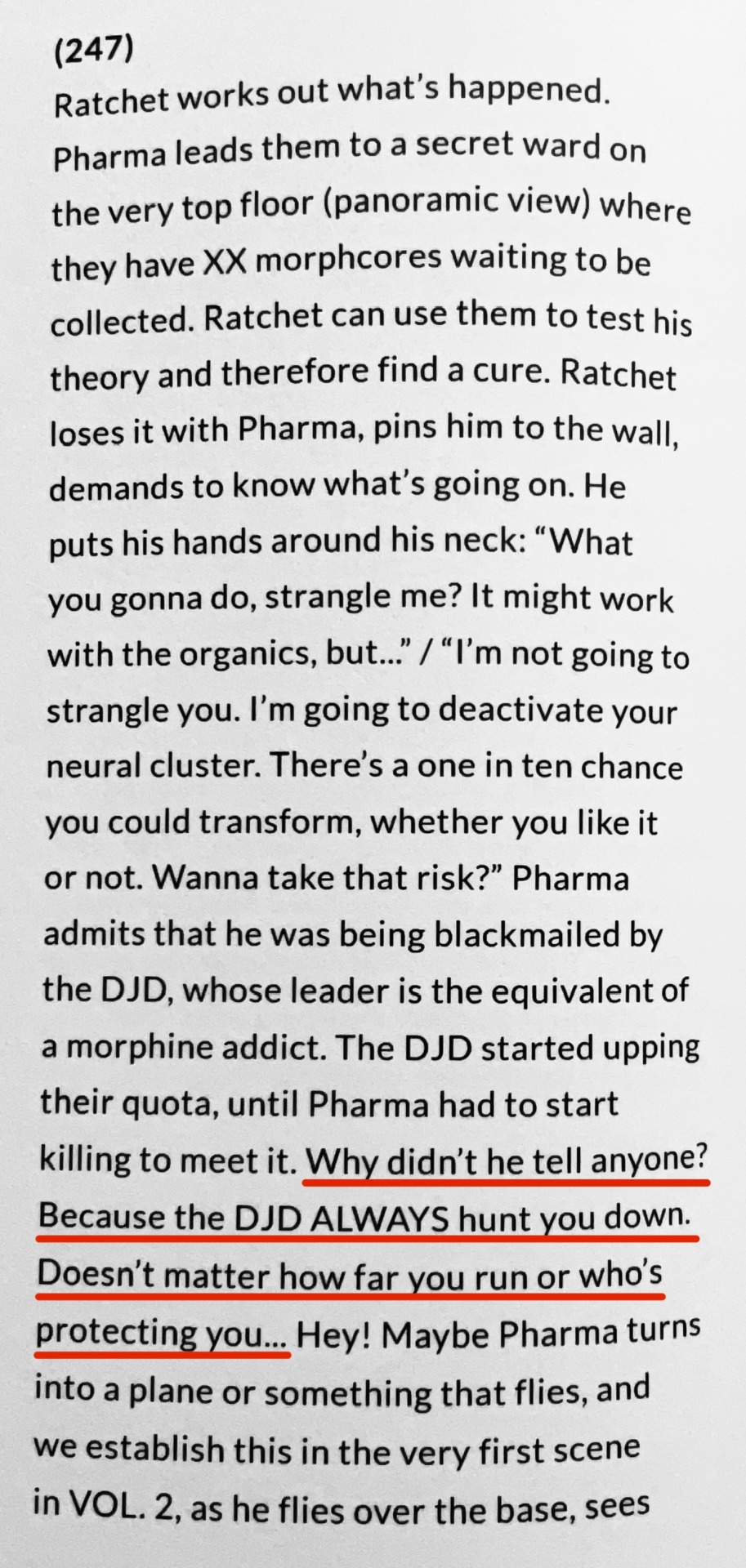
Simple as that. Pharma was aware of the scope of the DJD’s capabilities and relentlessness, and determined he was trapped prey.
Answer two (no word of god)
There are a few possible reasons Pharma didn’t call for help right away:
He was convinced all his other options would take too long and/or would still lead to him being put under suspicion. After all, being found to have harvested even a single T-cog from an already-dead patient for the DJD could have raised concerns that would lead to Pharma being investigated and/or having a mark put on his record.
He underestimated the severity of Tarn’s addiction, and was certain he could keep up with the T-cog demand without resorting to other means of harvesting, not realizing Tarn’s quota would increase later on.
He was already paranoid as a result of whatever mind games Tarn had set in motion at their first meeting, making Pharma think escape was futile.
Word of god or no word of god, there are clear reasons as to why Pharma ended up trapped. Most likely, it was a mix of all of the above.
Whatever was going on in Pharma’s mind before, he ended up in deeper trouble. Tarn increased his demand for T-cogs, and Pharma couldn’t keep up. By the time this happened, even if he had wanted to call for help, it was too late to do so without implicating himself. He reasoned his only option was to start killing patients to harvest their T-cogs.
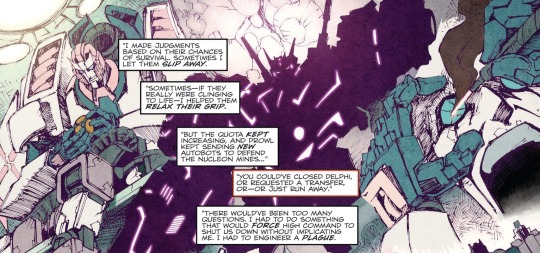
Soon, Pharma was so consumed with fretting over whether he’d be able to meet Tarn’s next demand that he didn’t have time or freedom to do anything else except worry and feel guilty. His whole life revolved around Tarn’s addiction; he was no longer in control, and could no longer enjoy whatever it was about Delphi he’d previously enjoyed. Perhaps the facility itself enabled Pharma to research cures and perform scientific miracles of medicine.
Being at the mercy of Tarn—convinced the DJD would find him no matter what—would have been pure psychological torture on its own, but also knowing that any small chance he did have of getting help would end in him losing everything would have added to his suffering. Pharma became desperate to reclaim control over his life and began planning an escape.
Now, JRO has said that Pharma didn’t originally plan to use the rust plague on the DJD…but canon says otherwise:

Of course, Pharma could have been lying to make himself look better in Ratchet’s view, but based on everything he’d been through up to this point with Tarn, it’s more likely he was telling the truth and had tried to eliminate the source of his suffering first. After all, wiping out the DJD would have been the simpler, cleaner option.
When the Duobots refused to detonate the soundbomb near the DJD, Pharma’s objectives shifted. He had to get Delphi shut down in a way that would:
Convince the DJD the shutdown was legitimate.
Pharma knew chances of escaping the DJD at all were slim to none, but he was desperate. Getting Delphi shut down would cut off Tarn’s supply of T-cogs and allow Pharma to escape Tarn’s immediate control, but the shutdown had to be “legitimate” to prevent Tarn from retaliating and hunting him down later. Leaving Tarn even the slightest chance of regaining control was too risky, so Pharma had to make sure his plan was as airtight as possible.
Cover up the patient murders.
If the truth got out about Pharma killing patients, he’d lose his medical license and most likely be put away for life. Being cut off from the practice of medicine and his intellectually stimulating work as a doctor would mean losing more than a job and a reputation. It would mean losing everything in which he’d anchored his sense of identity and life’s meaning. His refusal to consider any other options wasn’t just about ego and preserving his image as an excellent doctor; it was about preserving any kind of meaningful future he saw for himself.
Pharma needed a plan that would fulfill all of the above. Turning the engineered virus on the medical facility was the most effective and efficient solution. Anything else would have made him suspicious in the view of either Autobot High Command or the DJD, and neither of those would have ended well for him.
Because of his goal to preserve his reputation and future in medicine, he couldn’t even risk revealing anything to First Aid or Ambulon, who would have seen to his ruin. They became nothing more than loose ends that had to be tied up, and based on the fact that Pharma only prepared one vial of the vaccine, his original plan involved him being the only survivor:
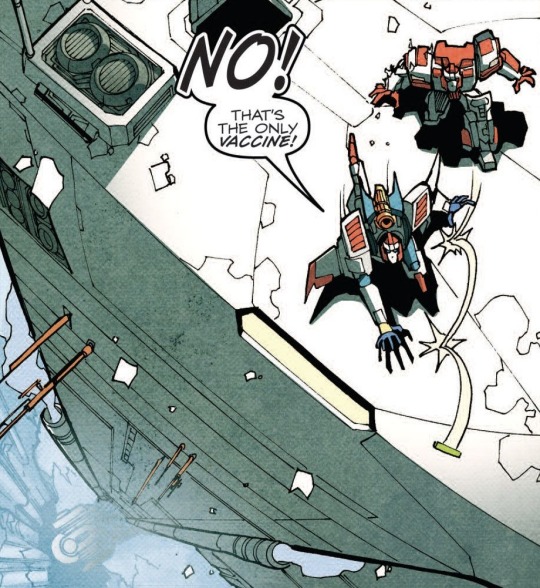
He probably would have had no problem making more of the vaccine for anyone else who survived, but he wasn’t counting on it. He wanted a totally clean slate; in letting his staff die with most of his patients, he would be getting rid of any and all evidence and reminders of his failures. He may have cared about First Aid and Ambulon before things got bad, but somewhere along the way, he decided either it wasn’t worth it to go through the trouble of finding a way to save them without raising suspicion, or he didn’t want to risk them putting together the pieces later on.
Of course, when Ratchet showed up, plans changed.
Ratchet
Ratchet is not the kind of person who seeks first to understand or be understanding. He’s inclined to trust what’s in front of him over anything abstract, and tends to look at the results of someone’s actions over trying to find any kind of ‘why’ behind them. Also, unlike Pharma, he operates from a strong moral sense, and reacts quickly and strongly when something or someone goes against that internal moral sense.
Ratchet’s reaction to finding out what Pharma did may seem hasty and harsh, but it makes perfect sense on a human level. There is no such thing as unconditional love; everyone has personal and moral lines (boundaries), and they’re different for each individual. When the most rigid of lines is crossed, that’s it; walls go up and the offender is cut off, no matter how strong the relationship may have been.
Ratchet obviously knew Pharma well enough to think he could try talking some sense into him, but then Pharma revealed that he’d crossed one of Ratchet’s lines: murdering patients. Any willingness Ratchet may have had to try to understand vanished. By the time Pharma started trying to provide a ‘why’ for his actions, Ratchet’s moral judgment had already shut down any chance of understanding what could have possibly led Pharma to kill patients. It didn’t help that Pharma seemed totally unapologetic and outright proud of his plan. For Ratchet, the ‘why’ didn’t matter anymore. What he saw was what he trusted, and what he saw was a friend who’d become his idea of a monster.
Now, Ratchet and Pharma’s relationship is one of the most confusing IDW relationships I’ve had the pleasure and pain of dissecting.
It is notoriously difficult to determine the depth and strength of a relationship from the outside. However, I’ve decided to go ahead and address it anyway because it has the potential to provide insight into Pharma as an individual.
If I were to sum up Pharma and Ratchet’s relationship in a single word, I would use “ambivalent.” The first time I read MTMTE, the thing that stood out to me most about their relationship was the drastic differences between how they each perceived the relationship.
In one sense, there’s the idea of Pharma basically being Ratchet’s crazy stalker ex, which is tossed around in fandom a lot. While I personally dislike seeing it regardless of context (yes, even as a joke), I do see how JRO’s writing choices set things up in a way that makes it easy to superimpose that trope.
In another sense, there’s the idea that Pharma and Ratchet were always close friends, and that what happened at the end of the Delphi story was a betrayal of both sides that came out of nowhere and whose consequences were taken too far.
I disagree with both. Personally, what I see at the end of the Delphi story isn’t an obsessed ex gone mad, a sudden betrayal, or a badly executed backstabbing. What I see is a breakdown of an already-complicated and poorly-maintained relationship: true feelings being revealed, long-repressed bitterness being forced to the surface, carefully-hidden cracks being split wide open.
Most people don’t have an accurate understanding of how much or how little they truly know the people in their lives, often overestimating how well they know a person until something surfaces and blindsides them.
According to JRO, Ratchet was oblivious to Pharma’s romantic interest, and throughout canon, it’s easy to see Pharma was more invested in the relationship than Ratchet ever was.
The question is, did Ratchet ever care about Pharma at all? And if so, to what degree?
Yes, Ratchet calls Pharma “buddy” and “friend,” but the former was sarcastic, and the latter means something different to each person. Also, in light of the circumstances, Ratchet could have just been saying “friend” in response to Pharma saying it—an emotional appeal more than anything.
However, Pharma must have been aware of Ratchet’s lack of relational investment because during the confrontation at Delphi, Pharma’s first reaction wasn’t to appeal to their friendship (ex: “But you know me!”). Instead, he appealed to their shared profession:
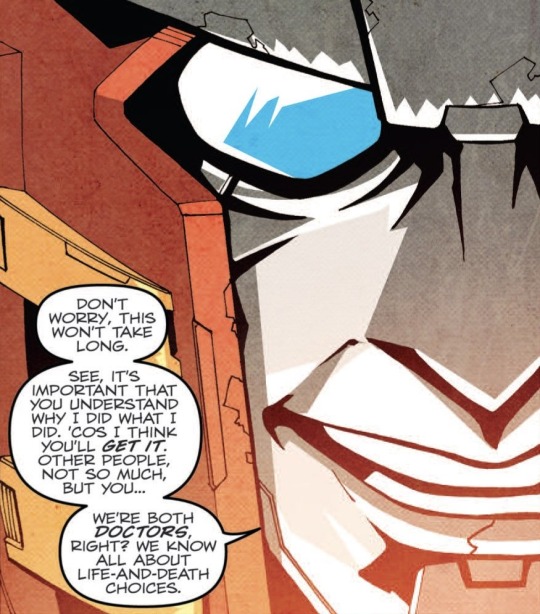
Then there’s the exchange of insults:
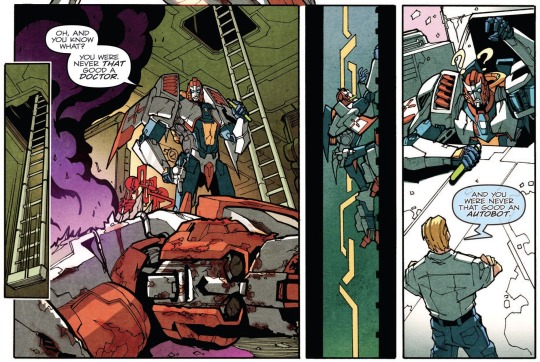
This is what I meant earlier by “true feelings being revealed.” Ratchet may have just been trying to match Pharma’s insult, but it’s unlikely it was merely reciprocal because while Ratchet is snarky at times, he’s sincere in that snark. There’s almost always some truth in his verbal jabs no matter how unserious they seem, and he’s never cruel for cruelty’s sake.
So, if Pharma saw Ratchet as an inferior doctor, and Ratchet saw Pharma as an inferior Autobot…it’s reasonable to assume there was always some deep-rooted competition and conflict preventing them from being super close.
Possible suspicion surrounding Pharma’s conduct as an Autobot paired with a tendency to misjudge the nuances of relationships could explain why Ratchet was so quick to decide Pharma was a lost cause. Maybe Pharma’s actions at Delphi confirmed something from the past that Ratchet had brushed off for whatever reason.
In any case, Ratchet seems to have been largely unaffected by the Pharma he found at Delphi. While leaving Messatine, he emphasizes that he’ll miss Pharma’s talent.

Not “who he used to be.”
Not “what we used to have.”
Just…“his talent.”
Later, on Luna 1, Pharma mentions that he and Ratchet were inseparable, but that could mean a few different things:
Best case scenario: Pharma and Ratchet sought each other out on equal terms.
Worst case scenario: Pharma followed Ratchet around.
Somewhere in the middle: the job forced Pharma and Ratchet to work in close proximity most of the time, and while Pharma intentionally ran into Ratchet more often than necessary, Ratchet also sought out Pharma every now and then.
Whatever the case, working with someone every day doesn’t tell you anything about who they are as a person, and the amount of time spent with someone doesn’t automatically correlate to how deep the relationship is or how well the people know each other. It’s not like either Pharma or Ratchet are shown to be good at expressing their personal feelings outside of extreme circumstances.
Ratchet does bring up late-night conversations of the past:

But while this indicates there was something deeper between him and Pharma, because neither of them were ever shown to be super open with their true feelings, it’s unlikely the conversations were full of touchy-feely talk. In all likelihood, the conversations were mostly medicine and war-related, with the rare spark-to-spark talk sprinkled in. Also, considering everything up to this point, one has to wonder if those talks ever meant anything to Ratchet, or if he was just digging for something that might stall Pharma’s torture.
Maybe those late-night conversations did mean something to Ratchet, but whatever the case, Pharma didn’t take the bait. He knew Ratchet was trying to stall by making an emotional appeal, and perhaps he was convinced the conversations hadn’t meant that much to Ratchet.
Looking at all of this, it’s hard to believe Ratchet ever cared about Pharma as more than an interesting work friend. But even if he had cared more than he let on, it wasn’t enough to overcome the doubts he had about Pharma’s character.
As for whether Pharma truly cared about Ratchet, I’m convinced he did, but in a mostly unhealthy way, and with a strong undercurrent of one-sided rivalry. At some point, Ratchet had been an equal and a source of challenge, and he probably listened to Pharma pretty often. It’s reasonable to assume Ratchet was one of the only people—if not the only person—able to handle Pharma’s intense temperament and challenge him in a meaningful way, providing some semblance of friendship for Pharma.
However, one last thing that stands out is that, when telling Ratchet why he’s torturing him, Pharma didn’t say anything like, “Because you hurt me” or “Because you turned against me—your friend.” Instead, he said it was for “ruining things at Delphi” and because “you declared war on my body.”
Either Pharma wasn’t being entirely honest, or Ratchet’s friendship didn’t mean as much in the first place as he’d previously implied. It’s possible the ‘Because you hurt me’ was implied in “for ruining things back at Delphi,” but why not say it outright? Perhaps it was a fear of vulnerability and admitting there was ever a relational need at all.
At the end of the day, it’s difficult to say for certain how close Pharma and Ratchet were, but it’s clear they were never on the same page and there were always barriers between them.
Luna 1
Revisiting the matter of Pharma’s morality taking a backseat to other priorities, his time on Luna 1 further underscores this. Again, Pharma chooses his battles and is unwilling to put himself at great risk for the sake of others, but a closer look at the situation with Tyrest reveals there wasn’t really anything he could have done for the Cold Construct population even if he had wanted to. It would have been him against Tyrest, an army of Legislators, and a bunch of Decepticons. Pharma knew his limits, and seeing as his goal was self-preservation, it was perfectly rational for him to go along with Tyrest’s grand scheme.
Besides, it doesn’t look like he was given much of a choice:

Although, knowing Pharma, he still would have demanded to know beforehand what he would get in return for the pain, and evidently, Tyrest held up his end of the deal since Pharma had access to the Luna 1 tech collection.
As for Tyrest’s plan to wipe out the Cold Construct population, there’s nothing indicating Pharma’s decision to turn a blind eye to it was rooted in malevolence or bigotry—just rational apathy: ‘I can’t stop Tyrest, so why concern myself with the outcome?’
Again, you can’t save everyone; Pharma had all he could do to save himself.
But it wasn’t all horrible. I would even go so far as to say Pharma found some happiness on Luna 1. Tyrest didn’t care about him, but he didn’t need Tyrest to care. Everyone else there hated him, but he didn’t need to feel like he belonged or was admired. At this point, Pharma’s only interest was Tyrest’s Luna 1 tech collection, and that meant playing nice so he could keep his reward. Back at Delphi, he probably assumed he’d never again practice medicine the way he’d loved; being brought to Luna 1 was an unexpected, yet welcome, second chance.
Even so, Pharma had his moments of cruelty. Back at Delphi, he had easily-identifiable reasons to kill patients—both the ones whose T-cogs he harvested and the 20 more he tried to kill when he shot the life support machine. But on Luna 1, he had no reason to be cruel, yet he chose to be. By this point, he’d mastered the ability to almost completely ignore or subdue his conscience.
In the case of Ratchet’s torment, one could argue Pharma only drew it out for retaliation purposes; it was personal for him.

As for cutting Ambulon in half, it was obviously meant to be as gruesome as possible, yet also quick. But personally, I don’t think it was about Ambulon; it was more about hurting Ratchet. Due to the fact that Ratchet’s identity is wrapped up in his compassion and his ability to be helpful as a doctor, one of the most effective acts of revenge would be to do something that makes him feel utterly helpless.
Also I wonder if, subconsciously or consciously, Pharma was attempting to recreate the sense of helplessness he felt back at Delphi under Tarn’s watch: “Do you see, Ratchet? Do you now understand how it feels to have control ripped out of your hands? To be totally helpless?”
Next, for some reason, Pharma was invested in the promised execution of Getaway and Skids:

He had no personal connection to either of them that would give him a reason to be interested, so maybe Tyrest told him he could perform the execution and/or have the corpses for medical experimentation. Either way, Pharma would have had a chance to use some of the tech in Tyrest’s tech collection, possibly explaining his excitement.
Of course, any chance of an execution disappeared when the final showdown went wrong.
When Pharma tried to escape to Cyberutopia and discovered he couldn’t pass through the spacebridge forcefield, he gave up. He’d been caught; he would no longer have access to Tyrest’s tech collection; Ratchet and every other self-righteous Autobot would never forgive him; and the morality lock prevented him from escaping. By all appearances, he would never again be able to engage in that which gave him a sense of meaning. He had shrunken his world down to his obsessive interest in a specialized field and one significant, yet unrequited relationship. With both of these lost, his world collapsed.
Yes, guilt played a part in Pharma’s despondency, but because he seems to have been in denial of said guilt, it’s more likely his despair was primarily due to the fact that he saw no future for himself. He had nothing left to live for.
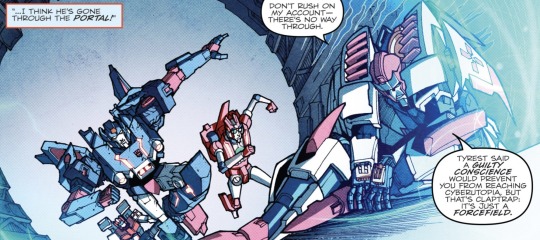
In light of this, Pharma’s flippant comments to First Aid make sense. He wasn’t being insensitive as much as he was goading First Aid. Pharma’s not stupid. First Aid had a massive rotary cannon on him, and Pharma knew exactly which emotional buttons to push to get him to pull the trigger.
Pharma wanted to die.
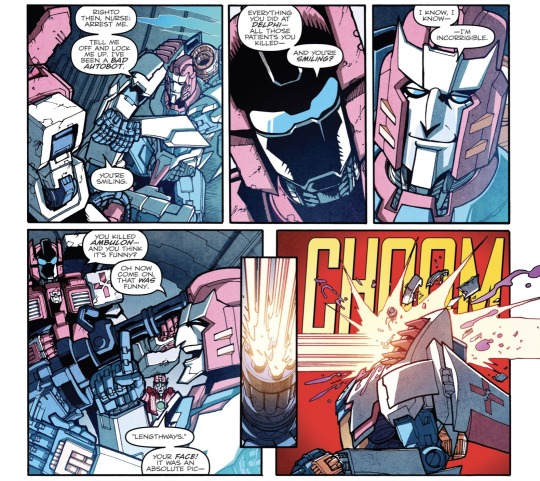
Adaptus
First, let me emphasize that Adaptus did not take possession of Pharma’s body. Instead, Pharma was the unwelcome guest:
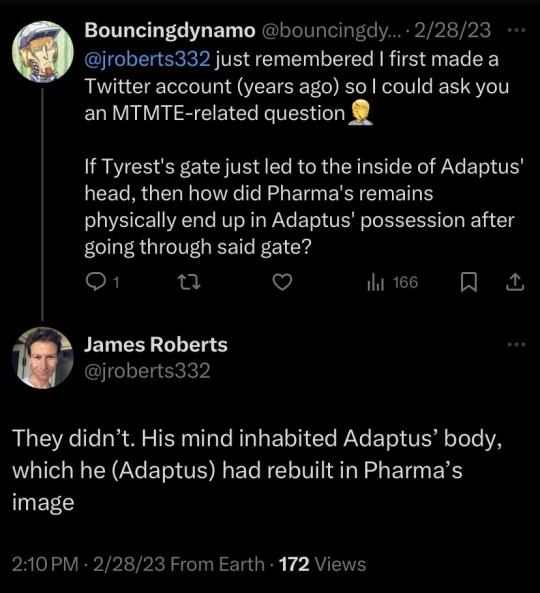
How Pharma ended up in Adaptus’ new body is a mystery, but whatever the case, Pharma didn’t pass on to the Allspark. Whether or not he had a choice can only be speculated.
First Aid had blasted Pharma’s head clean off, so whatever happened must have been related to the spark. Perhaps some residual spark energy was trapped in a body part that Adaptus repurposed, leaving Pharma tethered to the new body unwillingly.
Still, Pharma managed to assert his will and override Adaptus for a brief moment. Considering Adaptus was basically a god, this is impressive.
Based on Adaptus’ surprise at being interrupted, it seems he didn’t know Pharma was there. Why Pharma hadn’t tried to assert himself sooner is a mystery. Maybe Adaptus’ scheme was entertaining; maybe Pharma actually liked the company; or maybe he’d been waiting for an opportunity to get revenge on Tyrest for everything done to him back at Luna 1.
Sure enough, just like with Ratchet back on Luna 1, Pharma’s vengeful streak came out as soon as there was an opportunity.
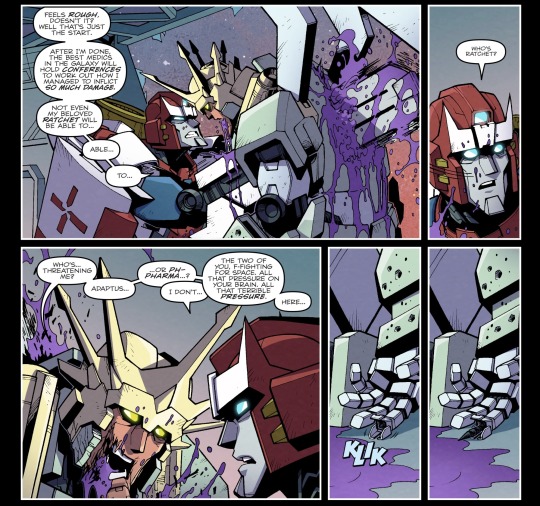
Unfortunately for him, this left him vulnerable, and Tyrest took advantage of the confusion:
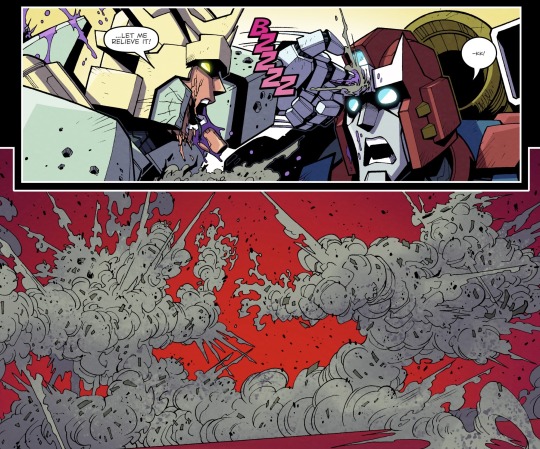
Conclusion
When someone reduces their world to narrow personal interests and one or a few very special people, their grip tightens around what little they have. They often become obsessive and possessive of the few things that make them feel alive, and their view of the world becomes increasingly more subjective and detached from the outside world. Pharma seems to have fallen into this trap.
Even so, in the context of the circumstances, several of the decisions he made were rational—even if coldly so. Oftentimes, “extreme” rationality and self-preservation are villainized in fiction, and characters like Pharma who don’t automatically put themselves at great risk for anyone and everyone are villainized, or at least looked down on. Their choices are often regarded as less human, but rationality and self-preservation are just as human as compassion and self-sacrifice.
Ultimately, Pharma was trapped and pushed over the edge into “insanity” by Tarn’s cruelty, but his own choices made from a place of pride determined how he fell, and how far he fell. It was a perfect storm of Tarn’s mind games and Pharma’s intellectual arrogance, excessive self-confidence, obsessive nature, and stubborn grip on the kind of future he wanted for himself.
Pharma is yet another Icarus who flew too close to the sun and paid dearly for it, and while JRO/the narrative could have given this Icarus better wings, that doesn’t change the fact that he chose to fly so high.
***
Many thanks to anyone who made it to the end of this monster of a post.
-tosses a Rodimus Star at you-
#idw transformers#idw1#maccadam#MTMTE#lost light#idw pharma#pharma#tf idw character analysis#tf idw meta#dr. fancy hands#nova’s nerding out again
780 notes
·
View notes
Text
Marcille is actually one of the biggest reasons it took so long to pinpoint which Chilchuck was the imposter in today’s episode.
The Senshi and Marcille imposters had their own reasons for being hard to decipher, but that was a joint effort on the party’s part. Chilchuck was the only example where a single member’s bias actually swayed the others so strongly that it made them all doubt themselves.
Ryouko Kui did an excellent job of giving us a rich background on how different races interact, and how they may descriminate against each other. Each of the races in this series struggles with these prejudices. Our main characters are not exempt from this, and we see it clearly in the way the shapeshifter manifested as each party member, showing us how the others percieve them.
Marcille knows Chilchuck well, and cares deeply for him as a friend. But she’s not immune to assumptions and biases that come from her elven background. The Chilchuck imposter we are faced with, when it’s down to two of them left, is Marcille’s memory of Chilchuck, Marcille’s perception of how he behaves.
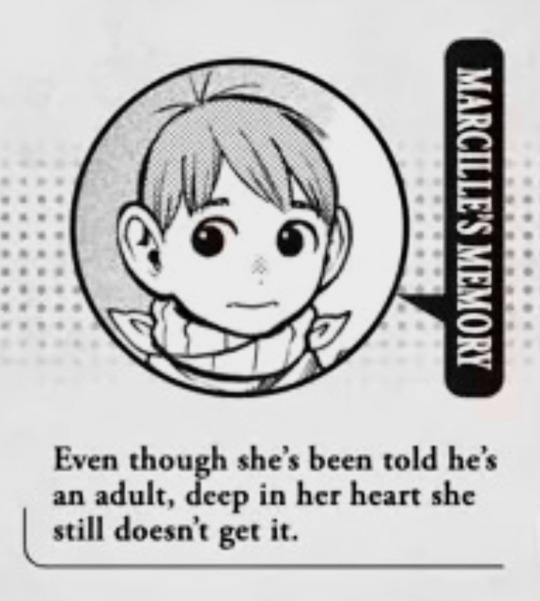
One of the first manifestations of this bias occurs when shapeshifter Chilchuck can’t get a jar open.
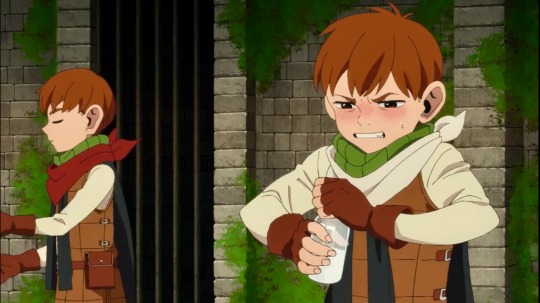
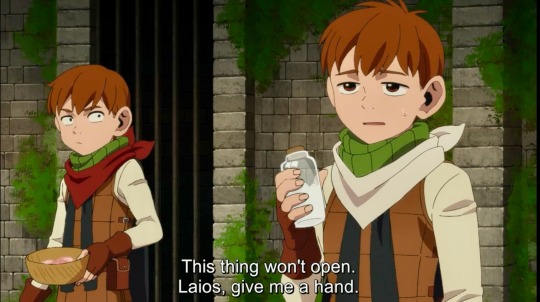
The real Chilchuck knows that this would never happen—at least not in this way. Chilchuck is proud, yes, but he asks for Laios’ help all the time. Laios is actually one of the party members he is the most likely to ask help from, given how long they’ve known each other, and how much mutual trust exists between them.
However, the whole scenario isn’t right. Chilchuck wouldn’t give up so easily on opening something; his whole job is opening and unlocking things. He would never quit an attempt like this within 5 seconds, then run to Laios so that “big strong adult tall-man” can open it for him.
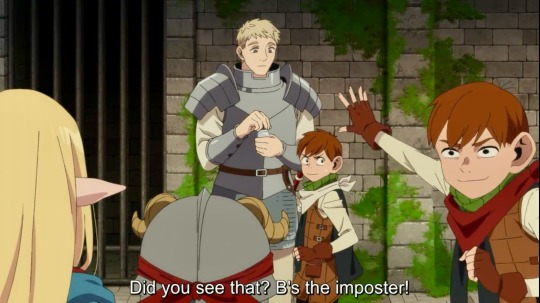
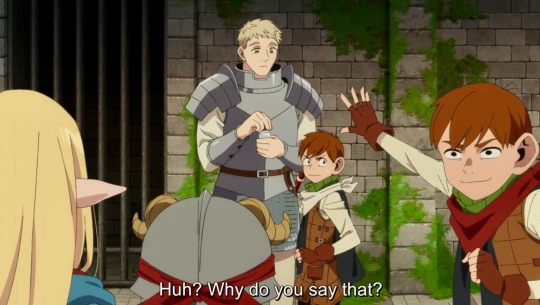
Marcille is the one who asks, “Huh? Why do you say that?” because Marcille is partially right. Chilchuck does rely on Laios, and Marcille knows this to be true. But she fails to realize how he relies on Laios.
Chilchuck respects many of Laios’ talents, but the most important ones are his combat skills, his emotional fortitude, and his quick thinking when delegating tasks. He trusts Laios as someone he is comfortable following (he literally said to him and Shuro in the last episode: “Laios!! Tell us what do!! Give us orders!!” when chimera Falin was quickly overpowering them).
So while Marcille almost understands Chilchuck’s confidence in Laios, she tends to accidentally infantilize him in the process.
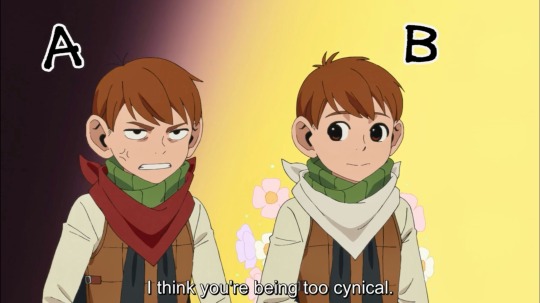
She immediately believes that Chilchuck B (the imposter, who is specifically using her own memory as its base for Chilchuck’s personality) is the real one, and says so, because she’s blinded by her perception of him as being childlike and adorable because of the very common racial prejudices that half-foots deal with all the time.
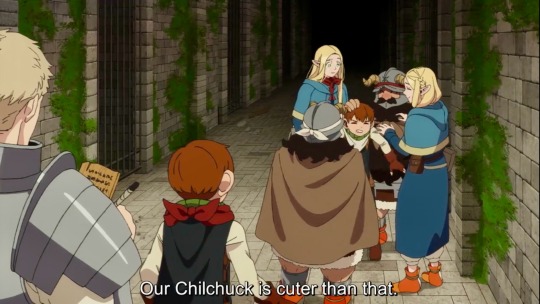
She dotes on the imposter, and is open with her affections, as usual (again, her care for him is clear), but doubles down on that bias, on her own assumptions of Chilchuck’s behavior shown through her own lens.
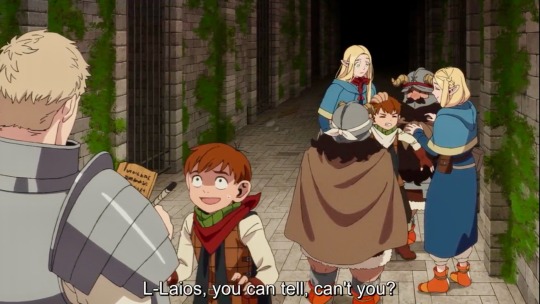
And ultimately, Laios was able to tell the difference, but only because he watched how the Chilchucks handled other minute tasks. Marcille’s stance on which Chilchuck was real truly did throw the others for a loop, at least until the threat passed. And honestly, that’s part of what makes the shapeshifter so terrifying. Its strategy almost worked.
#dungeon meshi#delicious in dungeon#marcille donato#chilchuck tims#laios touden#senshi#senshi of izganda#chilchuck#shapeshifters#laios dungeon meshi#marcille dungeon meshi#dungeon meshi analysis#neo queen serenity’s posts#dungeon meshi spoilers#dunmeshi#dunmeshi chilchuck#chilchuck dungeon meshi#this can be translated in a shippy light tbh#chilaios#does marcille ship them? does she assume chilchuck sees laios as his knight in shining armor? hehe#dungeon meshi episode 18#dungeon meshi anime#dungeon meshi meta
7K notes
·
View notes
Note
hello! I love your blog. you helped me so much with writing. if you don't mind can you do writing notes on character study. I wanted for so long to do it but I'm lost. thanks for everything
Writing Notes: Character Study
Character Study - a deep dive into a character’s traits, personality, and development in literature, TV, and film.
GUIDE #1. The model below provides a guide for the analysis of the characters in order to identify the personality of each of them, their attitude and the network of relationships holding together the drama/story. The analysis will focus on:
the character’s physical appearance (description of body and face, clothes and accessories);
story of his/her life (identification of all biographical elements that define the character’s story and situate him or her in relation with the others);
point of view (interpretation of the character’s perspective in relation to the overall vision of world as proposed by the author);
personality (description of the character’s behavior defining his/her personality on stage as it relates to others: tone of the voice, gestures, movements, distance or proximity to other characters);
description of the mask (different ways in which each character places himself/herself in relation to others);
definition of the mask’s motivation and choice through which the character will achieve his/her goals.

GUIDE #2. Identify each character on the 4 basic levels of characterization from information you find in the text. The following is a list of suggestions for each category. This is by no means an all-inclusive list, but meant to be used as a guideline:
A. Physical/Biological. gender, age, size, coloration and general appearance
Age – be as specific as possible
Gender/Sex – not only male/female, but virile, macho, feminine, etc.
Health – from excellent to sickly, including how one’s health may or may not effect his/her appearance.
Particular physical characteristics that makes the character distinctive – big nose, hunchback, large breasts, etc.
Ethnic origin – race, coloring of skin and hair
Physical Stature/Figure – perfect, average, tall/short, thin/fat, malformed, hunched, slouchy, willowy, etc.
Physical Activity - dynamic, active, sedentary, listless, etc.
Face – handsome, good looks, common, homely, etc.
B. Social. economic status, profession or trade, religion, family relationships
Class Situation – aristocracy, upper, upper middle, middle, lower middle, lower, beggar etc.
Economic Situation – rich, independent, salaried, day labor, dependent (just because someone is a member of the aristocracy, doesn’t mean they have money)
Social Situation/Social Role - how is the character related to the other characters in the play? Family? Friends? Co-workers? The boss? The King? Etc. Is there a specific social event taking place, such as a wedding, where in the character has to take on a particular social role, such as father-of-the-bride?
Relationship to the World around him/her – How does the character fit into his/her social situation? Is the character popular? Does he/she have friends? Is he/she a loner? Etc. How does the character interact with the other characters - is the character: a leader, a helper, a follower, submissive, a slave?
Occupation – list the character’s specific job or trade
Group Affiliation – Does the character belong to or identify with a specific group or team? (example – a minority group, a club, a sports team, a political group, etc)
Is there a specific social event taking place, such as a protest rally, where in the character identifies with a particular group, such as feminists?
Political affiliation – Republican, Democrat, etc.
Religious affiliation – Christian, Jewish, Muslim, etc.
C. Psychological/Emotional Reveals habitual responses, desires, motivations, like and dislikes – the inner workings of the mind. Reveals how the characters think (psychological) and what they feel (emotional). This is considered the most essential level of characterization. Keep in mind that a person’s thoughts and feelings can often be determined as a further extension of his/her physical and social characteristics. For example – under social, you can determine a character’s religious affiliation. Under psychological/emotional, you can determine what that person thinks or feels about his/her religion.
Psychological State – what does the character think about his/herself and the world around them? Is the character: open-minded objective, subjective, unselfish, selfish, paranoid?
Emotional State – what does the character feel about his/herself and the world around them? Does the character feel: accepted, rejected, oppressed, etc?
Emotional Depth - are the character’s relationships: life-long, lasting, moderate, passing, momentary?
Emotional Control – no temper, slow temper, even tempered, quick tempered, a loose cannon
Emotional Type – extrovert, ambivert, introvert...
Desires or goals – what does the character want?
Loves – what, or who, does the character value?
Weaknesses – what, if anything, is a potential psychological or emotional weakness, on the part of the character, that can interfere with the character obtaining his/her desire?
Prejudices – what, if anything, does the character feel prejudicial about?
Fixed Attitudes – Similar to a prejudice, but not with the negative connotation. For example, in your social analysis you’ve determined the character is Jewish. Now, determine how that character feels or thinks about Judaism – is the character: a zealot, a liberal, orthodox, conventional, a skeptic?
D. Moral/Ethical Reveals what the characters are willing to do (moral beliefs) to get what they want and what characters actually do (ethical behavior) when faced with making a difficult choice. Determine the characters’ moral beliefs and ethical behavior, and how those relate to the world of the play. Be very careful not to judge them based upon your own morals and ethics. For example, you may believe it is morally wrong for two people to live together unless they are married. However, in the world of this play/literature, no characters may hold this moral belief, and the playwright/writer may not be making a point about this moral belief, and therefore such actions are not to be seen as immoral or unethical within the context of the work.
Moral beliefs – an individual’s or society’s beliefs in what is right and wrong in terms of behavior.
Is the character able to determine right from wrong and to make decisions based upon that knowledge?
Determine the individual character’s morals, based on what his/her conscience suggests is right and wrong, rather than on what the law or society dictates.
Determine the morals of the world of the play in general: the principles of right and wrong judged by the standards of the average person or society at large, and how those principles govern standards of general and/or sexual behavior. Does the character hold beliefs in contradiction to those of their society?
Does the character evolve/change? For example, is there a moral belief the character holds at the beginning of the play that he no longer holds at the end of the play? In other words, does something happen for the character to change his mind and be convinced otherwise?
In the work itself, is there a “moral to the story”? Is the writer using the character as a positive or negative example in relation to this moral?
Ethical behavior – how an individual or society conducts themselves according to their morals.
How does a character’s moral beliefs affect his/her conduct? For example, is a character unable to act due to a moral/ethical dilemma?
How does a character’s goals affect his/her conduct? Is the character’s ethical behavior contrary to his/her moral beliefs? For example, a character believes it is morally wrong to commit murder, but to obtain his goal, his is willing to behave unethically and kill.
Does the character believe that he is acting ethically, yet is the writer holding him up as an example of how one should not behave?
Does the character behave according to or contrary to any of the 4 basic levels, therefore giving a false perception of themselves to the other characters? For example, you may have determined that a character is seriously ill, yet the character behaves as if he were in perfect health. Or a character may masquerade as someone he is not. What morals and/or goals are affecting this behavior?
E. Mental/Intellectual A 5th area you can consider. Reveals how intelligent and creative a character may be.
IQ – brilliant, good mind, average, dull...
Education – scholar, college, self-made, schooled...
Mental type – philosophic, scientific, mechanical, artistic, social, scientific...
Dexterity – dexterous, skilled, handy, clumsy, uncoordinated...
Creativity – genius, talented, original, unoriginal...
Interests, skills, accomplishments
QUESTIONS
Who is the Protagonist? Who is the Antagonist?
Which characters are of Primary Focus?
Which characters are of Secondary Focus?
Which characters qualify as ‘set dressing’?
Are any of the characters Symbols or Metaphors?
Are any of the characters Formalized Conventions?
CHARACTER ANALYSIS. A character analysis is a close examination and evaluation of one character from a work of fiction such as a novel, short story, or play.
The only direct description of most characters in fiction is of their physical appearance and/or their professions.
Their identities and traits are established through their interactions with other characters as well as their opinions, reactions, and moods.
For instance, while introducing Katniss (from The Hunger Games), the author did not bluntly state that she is courageous. Rather, this was demonstrated through several scenes in the book, such as when she volunteered to take her sister’s place at the Reaping.
In a character analysis, the writer’s job is to pick up on such hints and subtle clues in the story to reveal a clear image of the subject character. The writer can also evaluate the character, critiquing their development and the role they played in the plot.
Developing a Character Analysis. In order to write a character analysis, the first task is to choose the subject, if not already determined in the assignment question. It is easier to pick if the writer is already familiar with the text in which the character exists. Recognizing the types of characters also helps during the selection.
Once the subject character has been decided upon, the text ought to be critically read, with special attention being paid to the character.
As mentioned earlier, much of their personality and qualities are hinted at and indicated indirectly through their actions and thoughts, and not openly stated.
Thus, the re-reading should be done with the aim of picking up on these clues.
Oftentimes, the character’s backstory is also not included in the text but can be discerned from their behavior and characteristics. It, too, should be pieced together during the analysis, as it has a bearing on the character’s actions and lets readers better understand their motivations.
A record of the character’s involvement in each element of the plot, how this involvement affected other characters, and the eventual direction and outcome of the story should also be kept. Their own personal changes/growth/development should also be tracked.
Outline of a Character Analysis Essay
Introduction: The text and the character are briefly introduced. The thesis statement informs readers of the thrust and goal of the essay. It includes a claim about or evaluation of the character that will be borne out by the rest of the essay.
Body: The character is delved into in greater detail here. The analysis is laid out where their traits, appearance, backstory, and role are examined in detail. The character’s growth – or lack of it – are highlighted here as well. An outline drawn up during the prewriting process helps in organizing this section in a coherent manner that holds up the claims in the thesis statement.
Conclusion: The essay is concluded with a final assessment of the character that confirms the validity of the thesis.
Sources: 1 2 3 4 5 ⚜ More: References ⚜ Writing Resources PDFs
Hi, thanks for telling me. Glad to hear this! Here are some tips and guides I found for you. There are numerous guidelines available online, so choose which one (or combine elements from such guides) you want to use. You can find more details in the sources linked above. Hope this helps.
#anonymous#character study#analysis#writing reference#writeblr#studyblr#character analysis#literature#dark academia#writers on tumblr#spilled ink#creative writing#light academia#writing prompt#character development#writing ideas#writing inspiration#writing resources
276 notes
·
View notes
Text
They had so many good moments in the latest episode, but my absolute favorite was them just holding hands and talking casually. Soft, intimate, and just quiet trust.

#the apothecary diaries#kusuriya no hitorigoto#maomao#jinshi#apothecary diaries anime#jinshi x maomao#apothecary diaries manga#anime analysis#manga thoughts#anime fandom#light novel discussion#romance anime#slow burn romance#anime meta#historical anime#maomao and jinshi slow burn#manga and anime#littlecake manga
821 notes
·
View notes
Text
something something max's main color being red with blue highlights something something grace's main color being blue with red highlights something something motivations something something alive and dead something something
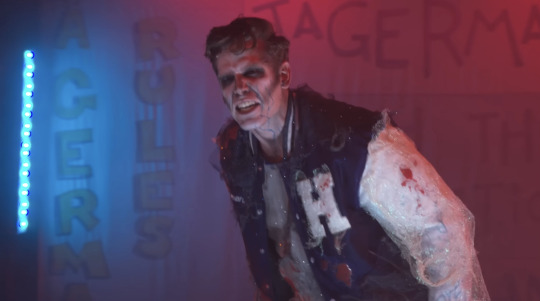

#would i like to do an analysis on the lighting? yes.#but for some reason my brain is only capable of analyzing bf and some bits of tgwdlm#dont expect much from me#but something i CAN say is that#the colors can represent their motivations and connections to the lords in black#such as dying in the waylon hall and getting to use the black book#and by motivations i mean#with grace; she decided to use the powers of the black book to get rid of 'dirty dudes'#which is something she most likely believes as a correct action#but the red highlights indicate the bits on evilness in her#it shows how her intentions don't change her actions#and for max; red is for vengeance#yet the blue highlights are used in here#mostly for 'who will pray for me' bit#and#this is something related. i believe that max was reflecting himself when saying those lines#it was not only for richie to repeat but also about himself#anyway back to the lighting#the blue represents that there is something deeper than just vengeance#'who will pray for me when im gone'#thats about himself. he knows that no one in the schoo really cared that much about his death besides the game#they only cared about the game. not max himself#so the lights during both npmd and ddmd represent#their connections to the lords. their motivations and intent. and how their actions are made#starkid#hatchetfield#nerdy prudes must die#npmd#max jagerman#grace chasity
564 notes
·
View notes